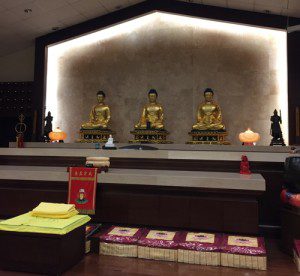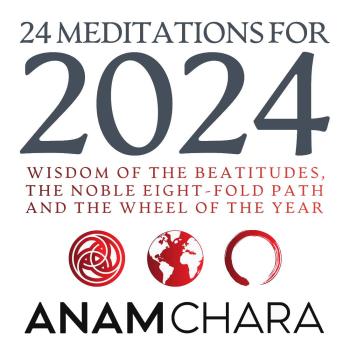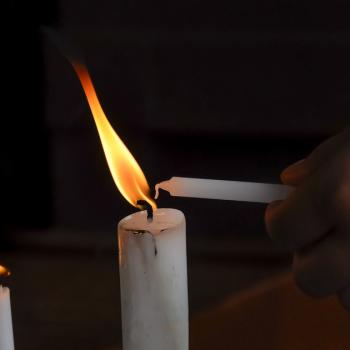
Last night I attended a Beginner’s Meditation Class at the Dharma Jewel Monastery in Atlanta. Dharma Jewel is the home to several Chan Buddhist nuns from Taiwan.
Recently, two friends of mine — one a Zen Buddhist priest, the other a Catholic theologian — suggested within 24 hours of each other that I would enjoy exploring Chan (the Chinese form of what in Japan is called Zen). So I signed up for this class, figuring it would be a way for me to connect with the nuns here in Atlanta.
I was blown away. Not only were the nuns themselves friendly, charming and full of enthusiasm (not only for Buddhism and meditation, but for sharing it with others), but the class was overflowing with probably more than 100 students, of all ages, both genders, various ethnicities, buttoned-down and tattooed. It was an exciting place to be, this Buddhist temple filled with folks eager to learn meditation.
It was your basic “Meditation 101” class, with instructions for a simple breath counting meditation and walking meditation, and some introductory remarks on the role that meditation plays within Buddhism. But what I took away from the evening was not so much the content of the class, but some real insights into how Christian contemplatives could learn a thing or two from our Buddhist friends.
- The nuns made it clear that everyone was welcome. As a committed, practicing Christian, I always wonder how I will be received in non-Christian settings, and again and again I am humbled by how much hospitality I am shown. Last night was no exception. The nun who taught the class emphasized not only that everyone was welcome to Dharma Jewel, regardless of their creed, but that Buddhism is compatible with all faiths, including Christianity. Christianity has such a long history of seeking to convert others that I’m afraid we don’t always do a very good job at welcoming others. So we have some catching up to do. Perhaps contemplatives can lead the way, if we can make it clear that our retreats, classes, workshops, centering prayer meetings, and so forth, are welcome to everyone, without any pressure to conform.
- They were enthusiastic about the benefits of meditation. This is a tricky one, for Christian contemplative prayer is meant to be a way for responding to the love of God, which means we often tend to downplay or even dismiss the ways in which it blesses us. Last night, the speaker repeatedly emphasized how meditation is good for you: how it fosters a peaceful mind, a stability of consciousness, and can be a great way to lessen fear, anxiety, anger, or stress. Christian contemplatives tend to want to keep our focus on God, not ourselves, so we don’t like to talk about the “benefits” of silent prayer. But maybe we should. I think we can still emphasize that the ultimate purpose of contemplation is not merely to reap personal blessings — but we can still acknowledge that such benefits really do tend to follow the practice of silent prayer.
- They were not afraid to talk about the link between their faith and their practice. I’ve participated in secular “mindfulness” training workshops, but this was different. The nun teaching the class patiently talked about who the Buddha was, what “Buddha” means (“awakened one”) and how Buddhist spirituality recognizes that everyone is a “potential buddha.” In other words, we didn’t just get meditation instructions, but we were invited to understand the spiritual and philosophical context of Buddhist meditation. The Christian corollary to this is that we are all called to be “partakers of the Divine nature” (II Peter 1:4), we are all called to union with God (I Corinthians 6:17). Christian contemplatives need to stop tip-toeing around this: we engage in silent prayer not just because we want to feel good or manage stress (but see #2 above), but because we are made in the image of God, and silent prayer reminds us who we really are.
- They recognize that there is a great spiritual hunger in our society today. You might argue that Buddhists have it good — their numbers in America are growing, while the number of Christians is in decline. But maybe the reason why Buddhism and other minority religions are growing so rapidly is because they are trying to meet the need of the people who have felt spiritually abandoned by the churches. Christians tend to be narrowly focussed on morality or justice — the conservatives worry about sex, and the liberals worry about poverty — and while no one would deny the importance of morality in spirituality (and yes, Buddhists have moral codes too), we need to balance Christianity’s “preachiness” with an invitation to the kind of glorious inner transformation that “you have the mind of Christ” implies.
- They honored their tradition but taught with humor and flexibility. My fifty-something body has difficulty sitting in even a half-lotus position, so I usually pray either sitting upright or with my legs gently crossed. The nun who taught the class last night very carefully explained (and demonstrated) both the lotus and half-lotus positions, and talked about why they are excellent postures for meditation — but then acknowledged that there’s no point trying to meditate when the body is severely uncomfortable, so they affirmed that we should sit in whatever way works best for us. Are we as Christians — whether contemplatives, or Christians in general — able to be like this, honoring the wisdom of the past while also acknowledging that sometimes new situations call for new ways of doing things? I don’t have anything specific in mind here, but I think it’s a question worth pondering.
Needless to say, I’ll be going back to Dharma Jewel, not because I want to abandon Christianity for Buddhism but because my deep commitment to Christ includes a strong sense of being called to interfaith and interspiritual exploration. But as I learn from these humble Chan nuns, I hope I will be inspired to be a more faithful and enthusiastic advocate for Christian contemplation as well.
Enjoy reading this blog?
Click here to become a patron.
Stay in touch! Connect with Carl McColman on Facebook:














